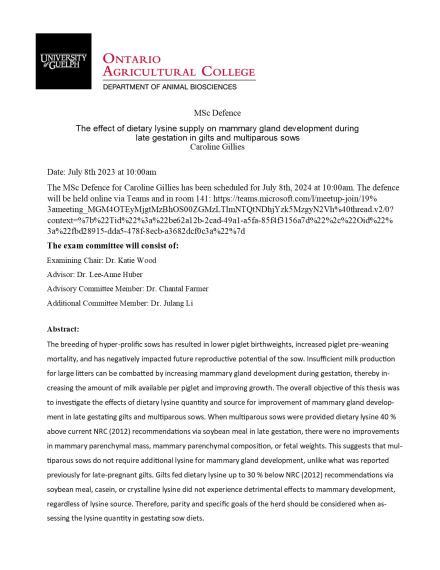Caroline Gillies' MSc Defence
Date and Time
Location
Room 141 and teams: https://teams.microsoft.com/l/meetup-join/19%3ameeting_MGM4OTEyMjgtMzBhOS00ZGMzLTlmNTQtNDhjYzk5MzgyN2Vh%40thread.v2/0?context=%7b%22Tid%22%3a%22be62a12b-2cad-49a1-a5fa-85f4f3156a7d%22%2c%22Oid%22%3a%22fbd28915-dda5-478f-8ecb-a3682dcf0c3a%22%7d

Details
Title: The effect of dietary lysine supply on mammary gland development during late gestation in gilts and multiparous sows
Abstract: The breeding of hyper-prolific sows has resulted in lower piglet birthweights, increased piglet pre-weaning mortality, and has negatively impacted future reproductive potential of the sow. Insufficient milk production for large litters can be combatted by increasing mammary gland development during gestation, thereby increasing the amount of milk available per piglet and improving growth. The overall objective of this thesis was to investigate the effects of dietary lysine quantity and source for improvement of mammary gland development in late gestating gilts and multiparous sows. When multiparous sows were provided dietary lysine 40 % above current NRC (2012) recommendations via soybean meal in late gestation, there were no improvements in mammary parenchymal mass, mammary parenchymal composition, or fetal weights. This suggests that multiparous sows do not require additional lysine for mammary gland development, unlike what was reported previously for late-pregnant gilts. Gilts fed dietary lysine up to 30 % below NRC (2012) recommendations via soybean meal, casein, or crystalline lysine did not experience detrimental effects to mammary development, regardless of lysine source. Therefore, parity and specific goals of the herd should be considered when assessing the lysine quantity in gestating sow diets.